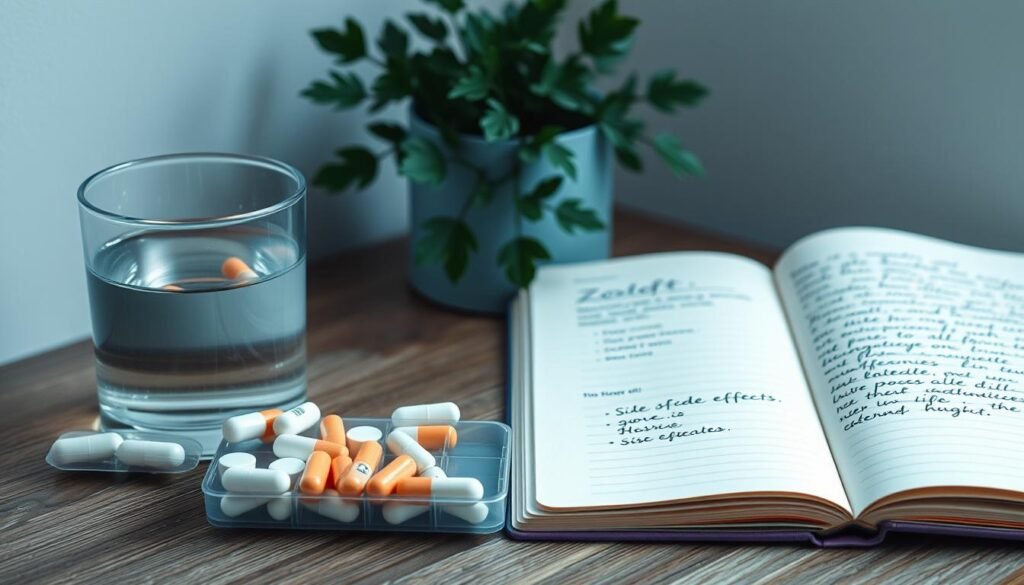Did you know up to 70% of people on antidepressants like Zoloft feel tired? This fact highlights a big challenge for those trying to beat depression and anxiety. While Zoloft or sertraline can help, it sometimes makes people feel drained. If you’re taking Zoloft, it’s crucial to know how to handle this tired feeling. This article will explore Zoloft, its effects on the brain, and how to manage the fatigue it may cause.
Key Takeaways
- Fatigue is a common side effect of antidepressants, including Zoloft.
- Finding effective ways of managing Zoloft fatigue can improve overall well-being.
- Light to moderate exercise may help combat fatigue associated with SSRIs.
- It’s important to consult a doctor if fatigue persists beyond a few weeks.
- Adjusting medication dosages or introducing stimulating drugs can be potential solutions.
- Engaging in good sleep hygiene practices aids in managing energy levels.
Understanding Zoloft: What is it?
Zoloft, also known as sertraline, belongs to a group called selective serotonin reuptake inhibitors (SSRIs). Doctors often prescribe this sertraline medication for depression, anxiety, and OCD. It helps by boosting serotonin in the brain, which affects mood, emotions, and sleep.
Zoloft can cause some side effects like feeling tired or sleepy. Research shows about 10% of people feel sleepy on it. Changes in sleep, especially the REM cycle, can make users feel tired.
Users might also get nausea, headaches, dizziness, or eat less. Some might feel more agitated or irritable. These effects can hit harder in those with chronic fatigue syndrome (CFS).
Talking to your doctor is key to deal with these side effects. They might adjust your dose or suggest other medicines. For many, adding exercise and improving sleep habits helps lessen the fatigue. Check more on fighting Zoloft drowsiness here.
How Zoloft Works in the Brain
Zoloft, also known as sertraline, is a type of SSRI. It stops serotonin from being reabsorbed in the brain. This action increases serotonin in the spaces between neurons. Knowing how Zoloft affects your brain is key to understanding your mental health treatment.
Serotonin helps control our mood. Higher levels can help with depression, anxiety, and OCD. Zoloft raises serotonin, which may boost mood and energy. This can be especially helpful for those who are depressed and feel tired all the time.
Serotonin also affects appetite, digestion, and sleep. Balancing neurotransmitters is important for our health. When taking Zoloft, improvements in mood may take a few weeks to show. Typically, it starts working in two weeks, with full effects felt in four to six weeks.
Before starting Zoloft, tell your doctor about any health issues or other medicines. Make sure to follow the dosage given by your doctor. You can learn more about Zoloft here.
Zoloft and Fatigue: Common Side Effects
Zoloft is a popular SSRI used to treat mental health issues. It’s important to know the zoloft side effects. Fatigue is a key side effect to be aware of. While about 10% report feeling tired, Zoloft generally causes less medication lethargy than other SSRIs. Knowing these differences helps patients set realistic expectations during treatment.
Overview of Fatigue as a Side Effect
Fatigue is common with antidepressants like Zoloft, leading to feelings of tiredness. This can be a hurdle when fighting depression. However, as the body gets used to Zoloft, the fatigue from SSRIs often lessens. Being aware of zoloft side effects allows people to talk openly with doctors about their energy levels.
Comparison with Other SSRIs
Zoloft tends to be less sedating than other SSRIs like Paxil. Side effect profiles differ, impacting daily activities. For example, Paxil may cause more daytime drowsiness. Understanding zoloft vs other SSRIs helps doctors create personalized treatment plans, considering lifestyle and side effect tolerances.
| SSRI | Incidence of Fatigue | Other Common Side Effects |
|---|---|---|
| Zoloft | Moderate | Diarrhea, nausea, decreased appetite, sexual dysfunction |
| Paxil | High | Weight gain, sedation, sexual dysfunction |
| Luvox | Moderate | Nausea, tremors, sleep disturbances |
| Celexa | Low | Dry mouth, vomiting, sleepiness |
Why Does Zoloft Cause Fatigue?
Starting treatment with Zoloft raises questions about its side effects. Zoloft, also known as sertraline, treats depression and anxiety. However, it often causes notable tiredness in users. The reason lies in how it changes serotonin levels in the brain.
The Role of Serotonin
Serotonin is key in controlling our mood. But increased levels can lead to serotonin fatigue. This tired feeling is common with Zoloft users. The drug is made to improve mood but might also make users feel drowsy. Those already dealing with depression might feel more fatigued because of the medication and their condition.
The Impact on Sleep and Energy Levels
Zoloft fatigue is partly due to its effect on sleep. It can change the REM sleep stage, lowering sleep quality. People on Zoloft often have trouble sleeping or sleep poorly. This results in lower energy levels on Zoloft. Bad sleep can make the fatigue worse, affecting daily life. To manage this tiredness, it’s important to fix sleep problems and make lifestyle changes to be more energetic.
Antidepressant Tiredness: The Effect of SSRIs
Using SSRIs like Zoloft affects people differently, especially their energy levels. It’s crucial to understand how these meds alter brain chemicals. This is because they impact serotonin, norepinephrine, and dopamine. These changes explain why people feel tired and face other side effects from SSRIs.
How SSRIs Change Neurotransmitter Levels
SSRIs boost serotonin in the brain, which affects mood. But, this can lead to changes in energy. As serotonin increases, it may also change norepinephrine and dopamine levels. These are important for managing our energy. So, feeling tired or having more energy on SSRIs varies by person. Knowing this helps us get why tiredness happens with these meds.
Individual Responses to SSRIs
How people react to Zoloft varies greatly. Genetics, health issues, and other meds play a part. Some might feel more energetic, others more tired. Acknowledging these differences shows why treatment must be tailored. Talking with doctors about side effects is key. This helps find the best approach for each person using SSRIs.
Managing Zoloft Fatigue Effectively
Handling Zoloft-related fatigue takes a multi-step approach. It involves adjusting medication timing and finding the right dose. Making changes in medication timing can boost energy for many people.
Adjusting Medication Timing
One method to combat fatigue from Zoloft involves altering when you take your medication. If you take Zoloft at night, you might feel less tired during the day. This because the medication’s effects peak while you sleep. Such a change can really help you stay more alert during the day.
Finding the Right Dosage
The amount of Zoloft you take is key in fighting off fatigue. Too much can make you more tired, but too little might not help depression symptoms enough. Working closely with your doctor to adjust the Zoloft dose is crucial. It’s important to find the right balance to improve both your symptoms and energy levels.

Physical Activity and Energy Levels on Zoloft
Regular physical activity boosts energy levels for those on Zoloft. Exercise helps improve mental health and fights medication fatigue. It makes the body release endorphins, lifting mood and energy. Choosing the right exercises is key to managing Zoloft’s side effects.
Benefits of Regular Exercise
Exercise offers many benefits for Zoloft users. It boosts energy levels, enhances mood, and improves thinking. It can ease fatigue, making people feel better overall. Also, aerobic exercise improves sleep, reducing tiredness. Exercise combined with Zoloft may better mental health. Studies show it may help with major depressive disorder symptoms.
Types of Exercise to Consider
Many types of exercise on Zoloft can boost energy and manage side effects. Here are effective options:
- CARDIOVASCULAR EXERCISE: Activities like brisk walking, cycling, and swimming raise heart rates and improve fitness.
- STRENGTH TRAINING: Weight lifting or resistance exercises build muscle strength and endurance.
- MINDFUL MOVEMENT: Yoga and Pilates mix exercise with relaxation, reducing stress.
- GROUP CLASSES: Dance classes or group fitness sessions increase motivation through social interaction.
Choosing fun activities makes it easier to stick with a fitness plan. Start slow and gradually increase activity intensity. This approach reduces Zoloft fatigue, boosting energy and overall health.
Good Sleep Hygiene Practices
Good sleep hygiene is key for those on Zoloft. It fights daytime sleepiness and boosts sleep quality. Making small changes can lead to better, more restful nights.
Avoiding Daytime Naps
Daytime naps might look good, but they can mess with your night sleep. This is true for Zoloft users fighting fatigue. If you stay up during the day, you’ll get tired by night and sleep better. Skipping short naps reduces insomnia and boosts sleep quality.
Creating a Sleep-Friendly Environment
For better sleep, making your bedroom sleep-friendly is key. This means:
- Keeping the bedroom dark, quiet, and cool.
- Choosing comfy bedding for better sleep.
- Cutting down on noise and light that interrupt sleep.
These steps greatly improve zoloft and sleep quality. They help you rest well, despite Zoloft’s side effects. To manage zoloft and sleep better, check out medical advice on Zoloft insomnia for more tips.

Coping with Zoloft-Induced Fatigue
If you’re tired because of Zoloft, getting good help is key. Talk to your doctor to share how Zoloft impacts you. They might adjust your dose or when you take it. This advice can help you feel more energetic.
Support from Healthcare Professionals
Doctors and nurses are vital in dealing with Zoloft’s side effects. They give tips and help for dealing with tiredness from mental health issues. If tiredness continues, they might suggest trying something new. Plus, they’ll offer more ways to cope, making sure you’re not alone in this.
Social Support and Community Resources
Friends and family are a big help when you’re dealing with medicine effects. They lighten your mood and strengthen your will to get better. By joining groups or finding community help for tiredness, you learn new ways to improve. These resources are important for a strong support network that aids in recovery.
Being social and using community help can lessen Zoloft fatigue. Keeping in touch and talking helps you feel understood and encouraged. For more info on fatigue and medical codes, see this detailed resource.
When to Consult Your Doctor
Knowing when to talk to your doctor is key when taking Zoloft. It’s important to keep in touch with them, especially to watch Zoloft’s side effects. This helps tailor the treatment to work better for you.
Monitoring Side Effects
Those on Zoloft need to watch for any side effects. If you feel more tired or notice other symptoms, talk to your doctor. They might change your dose if the tiredness doesn’t go away.
Being ahead of side effects means you can manage them better.
Exploring Alternative Treatments
If tiredness from Zoloft affects your daily life, looking at other treatments can help. This could mean trying other medicines or therapy. Talking about other treatments can help find the best way to deal with zoloft fatigue.

Zoloft Dosage and Fatigue: Finding Balance
Finding the right balance in balancing zoloft dosage is key for people managing fatigue. Zoloft, also known as sertraline, may cause drowsiness in about 10% of users. Compared to other SSRIs like Paxil, it’s less likely to lead to tiredness. An effective Zoloft dose helps with depression without causing too much fatigue.
Common side effects include insomnia, which can lead to daytime sleepiness. This makes it harder to tackle fatigue and depression. Side effects like nausea, dry mouth, and dizziness are also common. However, these usually improve after the first few weeks. If fatigue continues, a dose adjustment might be needed.
Doctors often start with a lower Zoloft dose and adjust as needed. If fatigue affects daily life after weeks, it’s important to talk to a doctor. They may adjust the dose, try different medicines, or switch antidepressants.
There are ways to fight fatigue caused by Zoloft. These include:
- Practicing good sleep hygiene to improve rest quality
- Engaging in regular physical activity to boost energy levels
- Taking Zoloft at night to reduce daytime drowsiness
Getting the right Zoloft dosage balance is crucial for managing both fatigue and depression. This leads to a more fulfilling and energetic life.
Conclusion
Managing tiredness when on Zoloft, also called sertraline, is a big concern. It can greatly change a person’s life. Understanding how Zoloft and managing tiredness connect is key. Patients can handle side effects better by knowing this.
Using good strategies for dealing with Zoloft is helpful. Changing when you take your medication, staying active, and sleeping well matters. These steps can make you feel a lot better.
Making changes in your life is key to beating tiredness from Zoloft. Talking with your doctor about your feelings and symptoms is important. They need to know to help you well. They might change your dose or suggest new treatments to make you feel more awake.
In the end, those using Zoloft should keep learning and be part of their treatment plans. With the right moves and support, you can work on your mental health. And handle side effects well.